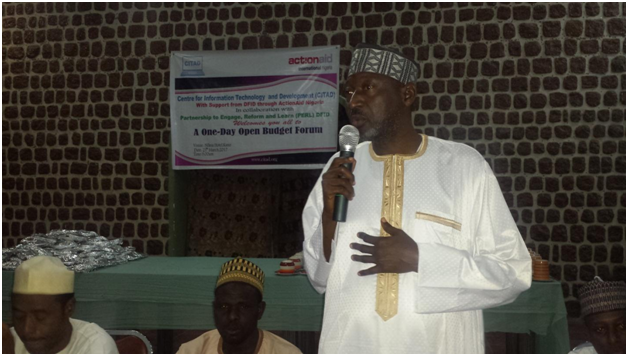
CITAD Holds Open Budget Forum for Kano Communities
By Hamza Ibrahim Chinade
The Center for Information Technology and Development (CITAD) in collaboration with Partnership to Engage, Reform and Learn (PERL) has sensitized community members from Karaye, Kabo, Kano Municipal Council, Nasarawa, Gaya and Rano local governments of Kano state. It could be recalled that CITAD with support from ActionAid International Nigeria began implementing the Strengthening Community Engagement in Electoral Process (SCEEP) project in eighteen communities across Kano state before the 2015 general elections in an effort to equip the communities with knowledge of being part of governance process by way of making tangible inputs in the budgetary allocation of governments at different levels which in essence will positively reflect on their livelihood. Â
Unveiling the objectives of the Open Budget Forum, the Executive Director of CITAD who was represented by Training Coordinator Malam Ahmad Yakasai hinted that part of the reasons for convening the forum is to help the government by educating citizens on how they can identify their needs and forward to government for consideration in the yearly budget as well help track, monitor and supervise projects in their different communities. When people are made to feel some sense of belonging in the governance process, the government will have no or less problems, because people can assist the government in checking implementation or otherwise of projects, Malam Ahmad added.
Also giving remarks, representative of ActionAid International Nigeria at the forum, Mr. Kenneth Okoeneme observed that coming together of people to talk about governance is very important for the development of the country and in particular for the development of Kano state, Kano state has taken a lead in the process of involving citizens and different stakeholders in the budgetary process and the process needs to be strengthened and institutionalized, and ActionAid will continue to support forums like these because of the role they play in engaging citizens.
Papers presented at the One Day Open Budget Forum are: Understanding the Concept of Open and Participatory Budget by Isah Garba of CITAD, Importance of Stakeholders Collaboration in Budget Process by Yunusa Hamza of Partnership to Engage, Reform and Learn (PERL), Role of CSOs and Community Members in Ensuring Successful Budget Implementation by Tayyib Isyaku Na’abba of Kano State Ministry of Budget and Planning and Analysis of Budgetary Allocation to SCEEP Communities by Kabiru Sa’idu Dakata of CITAD.
All the papers presented treated relevant concepts and engaged the participants in general discussion with questions, comments, observations and recommendations on the way forward which resulted in issuing a communiqué at the end of the event. Some of the participants observed that even though they have vital inputs to forward to the legislature they can’t get into its premises as policemen usually block access to the assembly, therefore the lawmakers should undertake periodic visits and consultations with their constituents on important matters such as budget preparation instead. To make the budget document easily accessible, some participants recommended that Kano State Government should upload a soft copy of its yearly budget on a publicized website and the Open Budget Forum should be held on a quarterly basis to provide a platform for continuous engagement between citizens and government institutions responsible for budgeting in the state. This would also serve as a platform to provide feedback on monitoring and tracking by citizens.
Giving a closing remark, Director, Community Development in the Ministry for Local Government Affairs Alhaji Mukhtar Isyaku Minjibir said the open budget forum has quite been a success considering the interactivity of the forum and promised to forward the proceedings of the event to the Commissioner for Local Government Affairs.
